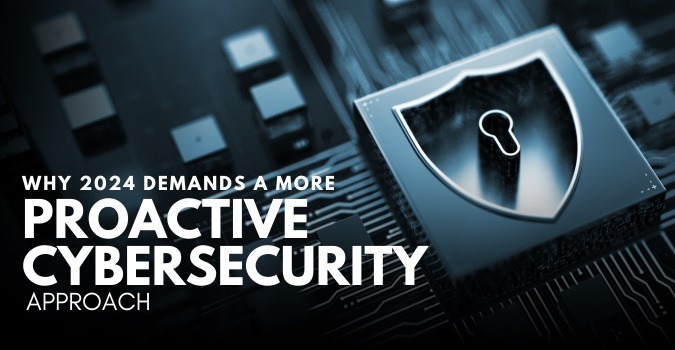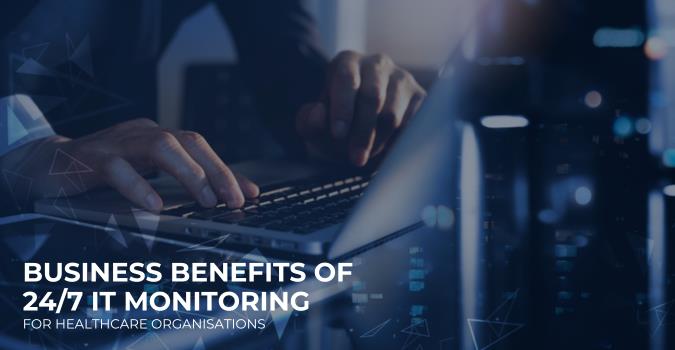Healthcare organisations rely on robust IT systems to manage patient records, facilitate telemedicine and support…

Why 2024 Demands a More Proactive Cybersecurity Approach
As healthcare continues to embrace digital transformation, the year 2024 brings forth unique challenges and opportunities in the realm of cybersecurity. With sensitive patient data, interconnected medical devices, and an increasing reliance on technology, the healthcare industry must adopt a Proactive Cybersecurity Approach to safeguard patient privacy and ensure the integrity of critical healthcare systems. In this blog post, we will explore why the healthcare sector, in particular, demands a proactive stance in the face of evolving cyber threats.
The Proactive Cybersecurity Approach:
In the healthcare sector, the stakes are exceptionally high, making a Proactive Cybersecurity Approach not just a choice but a critical necessity. It’s not just about reacting to data breaches; it’s about creating a multi-layered defense that anticipates and thwarts cyber-attacks before they happen. Here’s why healthcare organisation demands this shift:
The Evolving Attack Landscape:
Healthcare organisations are prime targets for cybercriminals due to the wealth of sensitive information they possess. The evolving threat landscape includes ransomware attacks, data breaches, and the exploitation of vulnerabilities in medical devices. A Proactive Cybersecurity Approach involves real-time threat intelligence, continuous monitoring, and proactive measures to secure the interconnected healthcare ecosystem.
Securing Connected Medical Devices:
The proliferation of connected medical devices enhances patient care but also introduces new cybersecurity risks. A Proactive Cybersecurity Approach in healthcare encompasses securing these devices from the outset, implementing robust authentication protocols, and regularly updating and patching firmware to address potential vulnerabilities. It’s about ensuring the security of the entire healthcare IoT ecosystem.
Patient Privacy and Compliance:
With stringent regulations such as HIPAA (Health Insurance Portability and Accountability Act) in place, healthcare organisations must take a proactive approach to compliance. A Proactive Cybersecurity Approach involves continuous risk assessments, regular compliance audits, and the integration of security measures to align with evolving regulatory requirements, safeguarding patient privacy and avoiding legal repercussions.
Zero-Trust in Healthcare Networks:
Healthcare networks are prime targets for cyber threats, and a Proactive Cybersecurity Approach in this context involves embracing the zero-trust model. Every user, device, and network component is treated as potentially untrusted, requiring continuous verification. Implementing multifactor authentication, encryption, and strict access controls are crucial elements of a proactive defense strategy.
Emergency Response Preparedness:
In healthcare, where timely access to patient data can be a matter of life and death, a Proactive Cybersecurity Approach includes developing and testing robust emergency response plans. This ensures that healthcare organisations can quickly and effectively respond to cyber incidents, minimizing downtime and mitigating the potential impact on patient care.
Embracing Proactive Cybersecurity Approach in 2024
Threat Intelligence: Gaining real-time insights into the latest cyber threats and vulnerabilities specific to the healthcare industry empowers proactive measures. Invest in threat intelligence feeds and leverage them to prioritize your security efforts.
Vulnerability Management: Proactively identify and patch vulnerabilities in your systems, applications, and medical devices. Prioritize patching based on risk and leverage automated vulnerability scanning tools.
Security Awareness Training: Train your staff on cybersecurity best practices, phishing tactics, and social engineering techniques. Regular training empowers them to identify and report suspicious activity.
Incident Response Planning: Have a well-defined incident response plan in place to minimize damage and ensure swift recovery in case of a breach. Regularly test and update your plan to adapt to evolving threats.
Data Encryption: Implement data encryption at rest and in transit to protect sensitive patient information even if it is compromised.
Multi-factor Authentication (MFA): Enforce MFA for all user accounts to add an extra layer of security beyond passwords.
Penetration Testing: Regularly conduct penetration testing to identify and address vulnerabilities in your systems and network before attackers exploit them.
Investing in a Secure Future:
By adopting a proactive cybersecurity approach, healthcare organisations can safeguard sensitive patient data, ensure the smooth operation of critical systems, and build trust with the public. Remember, cybersecurity is an ongoing journey, not a destination. By continuously adapting and investing in your defenses, you can ensure your organisation remains resilient against the ever-evolving threat landscape.
To assist you on this vital journey, consider partnering with experts in healthcare cybersecurity. MedicalIT.Services stand ready to offer tailored cybersecurity services specifically designed for the healthcare sector. Don’t wait for a breach to become a statistic. Contact us and take action to build a robust defense against ever-evolving threats.




